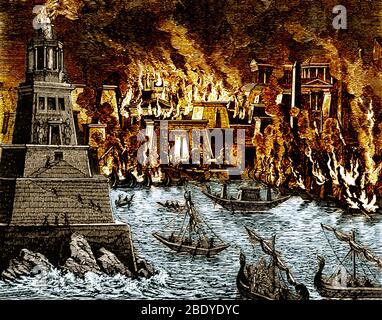Egypt Burning of The library of Alexandria - lxg090/Group-1-Wiki-Project- GitHub Wiki
The Great Library of Alexandria was established around 285-246 BC and located in Alexandria, Egypt (wikipedia,2022). This Library, along with its partnering branch Temple of Serapis was known to be one of the largest and most influential during its time. Within the library "over 100 scholars lived in the museum full time to perform research,write, lecture or translate and copy documents" (osu.edu, n.d). The library was the home of some of the "works by the greatest thinkers and writers...including Homer,Plato, Socrates" (Haughton,2011). Through the many conquests of power over the city, the great library came to be honorable but it was also the beginning of its destruction.

As it was being established, one of the very first rulers of the city, Ptolemy III, eager to earn power and the title of the greatest city, was willing to do what it takes to achieve that. There is a story told that Ptolemy III, would take a hold of all documents of new arrivers. His scribes would make copies of them and deliver the copy to the original owner, and keep the original works in the library. Some may say it was "hunger for knowledge". However, it is believable that this was also a way to observe power through the collection of knowledge.
Unfortunately, due to various changes of power in the city the library saw a decline and a great loss of meaningful texts. Many have pointed their finger towards Julius Caesar as the primary person in charge of its destruction. It occurred during Ceaser's Civil War in 48 BC, in the middle of chaos he ordered his soldiers to set fire to ships in the harbor. The fire spread towards the city and burned part of the library as well. It is said that about "40,000 scrolls were destroyed in the fire started by Caesar" (Haughton,2011). Even though the fire did not destroy the library in its entirety, the power it once held had diminished severely.

Another significant change was during the reign of Theophilus in 391 CE. Theophilus sent out orders for the Temple of Serapis to be destroyed and turned into a Christian church. Even though it is not proven to be true many believed that many scripts were taken and destroyed. It was "estimated to hold about 10 percent" of what the library held as a whole.
After many political battles in the city of Alexandria, there was one last one to blame. In the year 640 CE the Arabs took over the city after many years of trying to conquer it (Haughton, 2011). Many stories had painted the image of this library as one of the greatest of them all. However, Caliph Omar was not impressed by the works of the library and stated that “they will either contradict the Koran, in which case they are heresy, or they will agree with it, so they are superfluous" (Haughton, 2011). They then proceeded to burn down all the scripts as a source of heat for the bathhouses the city had. Their source of heat was said to have lasted for half a year.
The Great Library of Alexandria held a lot of knowledge that could have been of great use for many scholars and researchers at the time. Many believe that this was one of the biggest losses of knowledge in history and it could be possible. Yet scholars seemed to persevere even through these obstacles.
Citation
Chesser, P. (n.d.). The burning of the library of alexandria. eHISTORY. Retrieved September 16, 2022, from https://ehistory.osu.edu/articles/burning-library-alexandria
Haughton, B. (2022, September 15). What happened to the Great Library at alexandria? World History Encyclopedia. Retrieved September 16, 2022, from https://www.worldhistory.org/article/207/what-happened-to-the-great-library-at-alexandria/